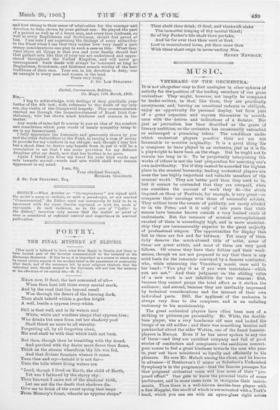POETRY.
THE FINAL MYSTERY AT ELEUSIS.
[This myth in believed to have come from Egypt to Greece, and there to have formeut part of the doctrine commnnicated to the initiated at the Eleusinian Mysteries. If this be so, it is important as a source to which may be traced certain suspects of the modern belief in the persistence of personality after death, and of the assurance felt by most religious thinkers that the individual soul, though merged in the Universal, will not lose the memory Or the affections of its earthly 111 e.—H. N.] HEAR now, 0 Soul, the last command of all—
When thou hast left thine every mortal mark, And by the road that lies beyond recall Won through the desert of the burning dark, Thou shalt behold within a garden bright A well, beside a cypress ivory-white.
Still is that well, and in its waters cool White, white and windless sleeps that cypress-tree ; Who drinks but once from out her shadowy pool Shall thirst no more to all eternity. Forgetting all, by all forgotten clean, His soul shall be with that which bath not been.
But thou, though thou be trembling with thy dread,
And parched with thy desire more' fierce than flame, Think on the stream wherefrom thy life•was fed,
And that diviner fountain whence it came. Turn thee and cry—behold it is not far— Unto the hills where living waters are.
"Lord, though I lived on Earth, the child of Earth,
Yet was I fathered by the starry sky :
Thou knowest I came not of the shadows' birth,
Let me not die the death that shadows die. Give me to drink of the sweet spring that leaps rrom Memory's fount; wherein no oypreSs'sleeps." Then shalt' thou drink; 0 Sett!, and 'therewith slake The immortal longing of thy-mortal thirst; SO of-thy Father's life shalt thou partake, And'be for ever that thou wert at first.
LosVin remembered loves, yet thou more thou
With them shalt reign in never-ending MM.
HENRY NEWBOLt;










































 Previous page
Previous page